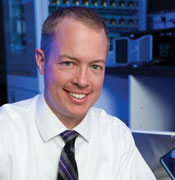Two University of Washington alums—Steve Singer, '81, and Ryan Oftebro, '95, '03—are carrying on the School of Pharmacy's tradition of pioneering innovations that improve access to pharmacy services and provide better care for patients in the state of Washington.
Singer, chief operating officer of Bellegrove Pharmacy in Bellevue (owned by Mark Holzemer, '73), has developed a telepharmacy program that allows patients in two Central Washington communities to get prescriptions filled in their communities without having to drive 60 miles round-trip to pick up medications. He undertook this effort after pharmacies in those rural towns went out of business, leaving thousands of people without local pharmacy services.

Ryan Oftebro uses robots and special packaging at Kelley-Ross Pharmacy locations in Seattle.
These two pharmacies follow a pilot program started at the clinic on the Stillaguamish Indian Reservation, near Arlington. Singer and his colleagues spent six months working out the telepharmacy concept with the state Board of Pharmacy to receive certification. The program has been a big hit: "As a Royal City community member for 45 years," says Sharon Chesterman, "I cannot begin to tell you what an asset Bellegrove Pharmacy is to our community. … Your presence in our community makes a difference. Keep up the good work."
Ryan Oftebro, '95, '03, owner of five Kelley-Ross pharmacies in Seattle, has been using robots and special packaging to free nurses and pharmacists from spending time filling Medisets (pill boxes divided by day of the week, morning, noon, evening and bedtime) so they can concentrate on patient care and education.
Kelley-Ross purchased a robot in order to develop a solution with Bailey-Boushay House in Seattle to help staff and clients manage medications. (Bailey-Boushay House, which is operated by Virginia Mason, provides end-of-life care for people with HIV/AIDS and similar conditions.)
Patients can take up to 60 or more medications daily, so filling Medisets used to take many hours of nursing time. The robot holds 200 different medications and prepares cellophane strips of packaged medications. These "medistrips" are labeled by patient, drug and time of administration.
These machine-assembled strips have been estimated to save as much as $80,000 in nursing hours previously spent packaging pills. Kelley-Ross also uses robots to fill, label and cap bottles of medication. Barcode technology is used to minimize the chance of error. "Embracing innovative technology," Oftebro says, "has allowed us to respond to our patients' increasing needs, while improving safety and efficiency."